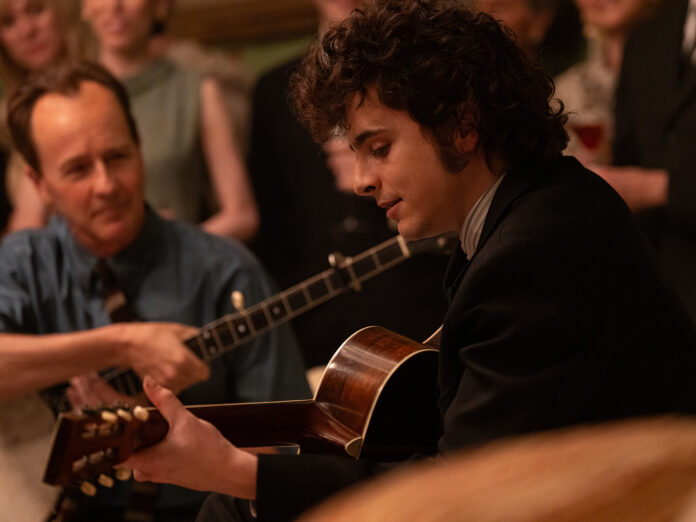When the wild, rambling film of Rolling Thunder Revue was released back in 2019, it came with the subtitle “a Bob Dylan story by Martin Scorsese”, in what felt like a nod to the endless stream of franchise extensions that come tagged as “a Star Wars story” or “a Mad Max saga”. It cutely suggested that, with the MCU floundering, the 2020s might see a full flowering of the Bob Dylan Extended Universe, with movies, miniseries and, eventually, collectable figurines dedicated to the lost highways, side quests and minor characters of "My Back Pages".
When the wild, rambling film of Rolling Thunder Revue was released back in 2019, it came with the subtitle “a Bob Dylan story by Martin Scorsese”, in what felt like a nod to the endless stream of franchise extensions that come tagged as “a Star Wars story” or “a Mad Max saga”. It cutely suggested that, with the MCU floundering, the 2020s might see a full flowering of the Bob Dylan Extended Universe, with movies, miniseries and, eventually, collectable figurines dedicated to the lost highways, side quests and minor characters of “My Back Pages“.
If so, then A Complete Unknown is the A New Hope of the Bobiverse, telling our hero’s journey in time honoured fashion. A young farmboy, raised in the wastelands of the midwest, heeds the call of a shambling, hermetic mentor (Woody Guthrie), and travels to the distant planet of Greenwich Village, 1961, where he absorbs the force of the folk revival. He falls in with an eccentric band of rogues (Dave Van Ronk, Albert Grossman, Johnny Cash), meets what seems to be his true love (“Sylvie Russo”, a version of Suze Rotolo), and begins his journey to the dark heart of the 1960s. He survives setbacks and romantic ordeals, takes up his mystical weapon (a 1964 Sunburst Fender Stratocaster) and travels to the belly of the beast (Newport Folk Festival 1965) where he vanquishes the dark father (Pete Seeger) before heading out on his Triumph Tiger motorcycle for the open road once more.
Five years in the making, James Mangold’s film is a rich, handsome and largely faithful retelling of this beloved old standard. Even more than Joel and Ethan Coen’s Inside Llewyn Davis, it conjures the buzz, hum, slush and drone of a Greenwich Village full of cranks, seers and, yes, tambourine men. It assembles a sterling supporting cast including Scoot McNairy (Business Bob from Once Upon A Time In Hollywood) as the ailing Woody, hospitalised with Huntington’s but still raging against the dying of the light, Ed Norton giving a career peak performance as the idealistic, conflicted Pete Seeger (it’s hard to believe he was only a late addition after Benedict Cumberbatch dropped out – it’s impossible to imagine another actor in the role) and Dan Fogler, fresh off portraying Francis Ford Coppola in the misbegotten The Offer, threatening to steal yet another show with his Albert Grossman (possibly the most rock and roll performance in the film).
At the heart of it all, Timothée Chalamet is the quizzical eye of the gathering storm. Having prepared over the past decade by playing a series of messianic freaks, from the student revolutionary Zeffirelli in Wes Anderson’s The French Dispatch to Paul Atreides in Dune and the young Willie Wonka, he seems abundantly prepared for the role, nailing the hobo stroll, the mercurial moods and the inscrutable cool. Covid delays gave him time to master the songbook – and he’s a revelation as a singer, performing over 40 songs, from the early, flinty “Song To Woody” right up to the ferocious “Like A Rolling Stone” amidst the havoc of Newport. His musical performance is by far the best thing about the film – it’s hard to resist joining in with the applause of those early, confounded, enchanted audiences.
As an Uncut reader, you may have some qualms. Though based on Elijah Wald’s Dylan Goes Electric!, in familiar biopic fashion the story plays fast and loose with the historical record, cavalierly conflating people, places and events. And it doesn’t really know what to do with either Sylvie or Joan Baez, who spend much of the film simply gazing wistfully, resentfully or with plain exasperation at the wilful upstart.
But if Rolling Thunder had several wildcards up its sleeve, Mangold (whose 2005 Johnny Cash biopic Walk The Line offered an ultimately well behaved kind of outlaw) seems to take his liberties in the name of neatness. Though Bob himself apparently annotated and signed off the script himself, you might struggle to detect much of his mischief in the polished finished product. There is lightning in many of the performances, but as a film A Complete Unknown never quite goes fully electric. Maybe, as with Star Wars or The Godfather, the real crackling heart of darkness will come in the franchise’s second episode…



